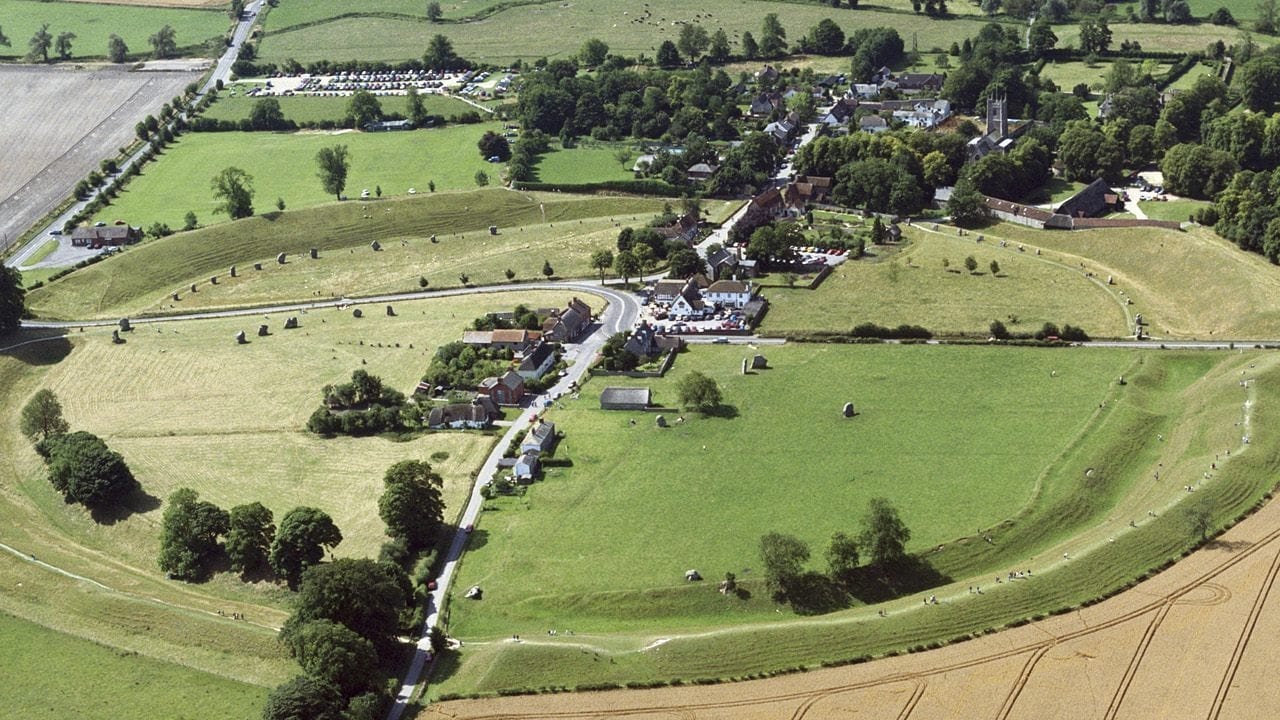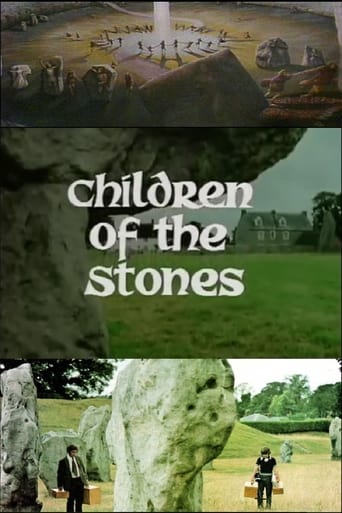

The music was so corny I almost abandoned the video immediately. It was extremely bad and amateurish. It almost makes the film unwatchable, like something in a high school video project.The video is broken into 10-minute segments, each with opening and closing credits and a recap of the previous segment. This is tedious.The science is pretty shaky, but at one point went completely off the rails. They decide some stones point up permanently aligned with a star in Ursa Major. Vertical stones in England would never align so far north. Further, no English stones would be permanently aligned anywhere because the earth rotates and revolves around the sun.In general, the science is utterly embarrassing. It would be too silly even for an Austin Powers movie.I think the writer went to a math library and grabbed snippets and formulae at random to include in the script. Given that there is so much of this and that it is central to the plot, I think they could have hired a real (or at least student) mathematician to compose some plausible dialogue.The movie is carried by Matthew, a scientist's ten-year-old son. He is unusually intelligent, curious and spunky. He is a considerably better actor than any of the adults in the movie. The acting, in general, has a stagy feel with lots of contrived exposition.They show you something strange, then let you sit with it for a long time before giving their explanation. It does a good job that way of building suspense. The way they build unease is by showing you very ordinary things, but that just should not happen, like a giant stone appearing in a different place. There is almost nothing that would count as a special effect, other than possibly a dissolve.Despite all the negative things I said about the movie, it was engaging. I cared about the characters. It was creepy. The very last reel was high camp. I expected the villain to play Toccata and Fugue on an organ.
... View MoreThere is so much rubbish on children's television these days, much of it populated by good-looking American children. So to be able to stimulate one's children's minds a brilliant story from the 70s, fortunately still intact and available on DVD is a blessing.My own children thought that having to watch an 'old' programme was a terrible idea and would far rather have spent another few hours on their mind-numbing tablets, however I did manage to convince them to watch the first episode, and then if they didn't want to continue, they didn't have to.Well, they were transfixed and ended up thoroughly enjoying the story, the seven episodes divided up into three chunks.In my opinion, the great thing about the story apart from the notions of a mad high priest, normal people being turned into brain-dead zombies, people being turned to stone, and a narrow escape for the protagonists, is the idea of circular time, similar ideas having been exercised in Dr Who and Back To The Future to name but a few.It could and probably will, all happen again. And if you get the opportunity to visit Avebury (the location for the fictional Milbury) then pick a bright sunny day and do so. It took me right back....
... View More(Some spoilers)Children Of The Stones has been called 'the children's Wicker Man' - one indication of the high regard with which this seven-part 1977 British television series is still held. Resemblances between Robin Hardy's 1973 cult classic are certainly strong, notably the pervasive strength of the pagan cult which threatens to overwhelm Adam Brake (Gareth Thomas) and his son Matthew (Peter Denim). Other influences include that of Nigel Kneale, whose work had been so prominent in British TV science fantasy. Thomas had already appeared playing a minor part in Kneale's Quatermass And The Pit (1967). The year after the present series was aired saw a last Quatermass, which concerns an unknown alien force 'harvesting' the youth by leading them to ancient ritual sites. The parallels between the fatal rapture of Ringstone Round, the 'happiness' of Millbury's own initiates, and the ominous role of megaliths in both shows, are striking. Filmed on location at Avebury, Children Of The Stones follows the usual technical format of 1970s' kids shows (video used for internal studio sequences, film for the atmospheric scenes shot outside). Sidney Sager provided an especially effective score, using a mainly wordless chorus for the credits and ghostly female soprano soloist. The series shares some of the weaknesses of the time (somewhat under-directed acting, and ripe performances, notably that of Freddie Jones, who plays Dai, the Welsh inebriate) and strengths, chief of which is a complex storyline, one completely different from the contemporary transatlantic product. Millbury, where the action takes place, is at the apex of numerous lay lines, a hub of psychic activity, a place of power into which it proves much easier to enter than leave. Hendrick's (Iain Cuthbertson) Millbury house is situated at the middle of the ancient stone circle which astrophysicist Brake arrives to study. More than just the defunct 'prehistoric Jodrell Bank' he envisages, this impressive monument marks the coming together of a number of still-active forces and traditions, offering physical and mental challenges to investigators. These combine in the figure of Hendrick, and Hendrick's home, the focus of events. It is here that the transformation of mind occurs, where the villagers chant and dance. "There are more things in heaven and earth than I have philosophised in my dreams," admits Brake to Margaret (Veronica Strong), expressing somewhat awkwardly the confusion he feels. In Millbury as he discovers, pure mathematics and modern science rub shoulders with the mysterious workings of age-old mysticism and rural legend. Balancing everything, creating a coherent world picture, is what gives the plot most of its interest. Brake and his precocious son are both intellectuals, empiricists by instinct, gradually brought round by circumstance to a necessary belief in 'the existence of that which exists'. (The words on the enigmatic picture which originally inspired Matthew's interest in the site.) Former scientist Hendrick, discoverer of the supernova at the heart of the mystery, is one who has already crossed that line. As Brake rightly identifies with some distaste at the end, Hendrick has since moved from professional astronomer to visionary 'magus', exchanging the certainties of science for the excesses of egocentricity. Brake and son have the problem of interpreting and adapting to events, while remaining intellectually independent, something which imminent brainwashing ultimately threatens to destroy. Away from external dangers, at the core of the narrative is the quartet of relationships between the Brakes, Margaret, and Sandra (Katherine Levy). The romantic interest between Adam and the female curator is, understandably muted, although enough feeling remains to ensure that the fate of the mother and daughter has some emotional drama at the climax. Alone out of the 50-odd villagers (the outsider Dai excepted) it is they who stand out in our mind, and exclusively they whom the Brakes struggle to rescue from amidst the doomed chanters. Particularly as played by stodgy Gareth Thomas, Professor Brake proves a dull fellow, whose son is far more interesting. Thomas (whose screen presence sometimes reminds one of the 1950s' British actor John Gregson) often has to work hard to convince us that his character is anything like as intellectually nimble as we might expect. (He later went on to star in another cult TV show, Blake's 7.) By contrast, Matthew Brake is exceptionally bright and much more dynamic, recognised by Hendrick early on as a worthy adversary. It is the son who triggers many of the key discoveries driving the plot. But even the younger Brake is somewhat daunted by the abilities of the happy pupils in the village school, whose mental prowess recalls the alien prodigies in The Village Of The Damned (1960). Iain Cuthbertson, on the other hand, who had earlier worked with Thomas on another UK TV series, Sutherland's Law, acts the genially threatening Hendrick very skilfully, and does a good job. The end of the series has been dismissed as a cop out, and certainly the abrupt interjection of a parallel time, circular chronology universe is unexpected. After the astro-psychic events just witnessed it is, frankly, one twist too far. Admittedly it is difficult to think of another way to end with a point of interest once the circle has been broken, and tension dispelled. Clearly a downbeat ending, such as concluded The Wicker Man, would have been difficult in a children's show, but the result of the Brake's final questioning of all events is to undermine the careful investigations and deductions made before. The miraculous restoration of friends and villagers is reassuring but, although such events may suggest a hallucination, the defusing of earlier tension is a let off. The re-introduction of Hendrick and his butler Link (as a fresh purchaser of the house, and estate agent, respectively) does nothing more than further muddy narrative waters, and the show really demands a more satisfying conclusion. Despite this disappointment, Children Of The Stones continues to hold the attention, primarily because of the audacious plot. If the concepts are far-fetched, they are never less than interesting, and worth revisiting.
... View MoreIf ever any one ITV region was the head of the pack when it came to producing children's TV, then HTV West, on the merit of "Children of the Stones" alone, would be it.Broadcast in 1977, COTS is a 7-part fantasy series set in the fictional village of Milbury. Starring a pre-Blake's 7 Gareth Thomas and 70s telly stalwart Iain Cuthbertson, this delightful little series concerns a scientist and his son's attempts to discover the secret power behind the Milbury stone circle.This is an incredibly eerie sci-fi series and to call it a kids show is a bit of an insult. It is a well crafted tale, brought to the screen with some very adept direction and a remarkably haunting musical score.The performances from the cast are uniformly excellent and special praise must got to the talented youngsters involved.If you can get a hold of this tremendous series then I can highly recommend it. However, it has been deleted on video in the UK for some time.COTS is kids TV at its best - thoughtfully written, well acted, amazingly directed and a delightful, summery, eerie masterpiece. Because of its folksy score and pagan references COTS has been referred to as "The Wicker Man" for kids - it could be called a lot worse.
... View More